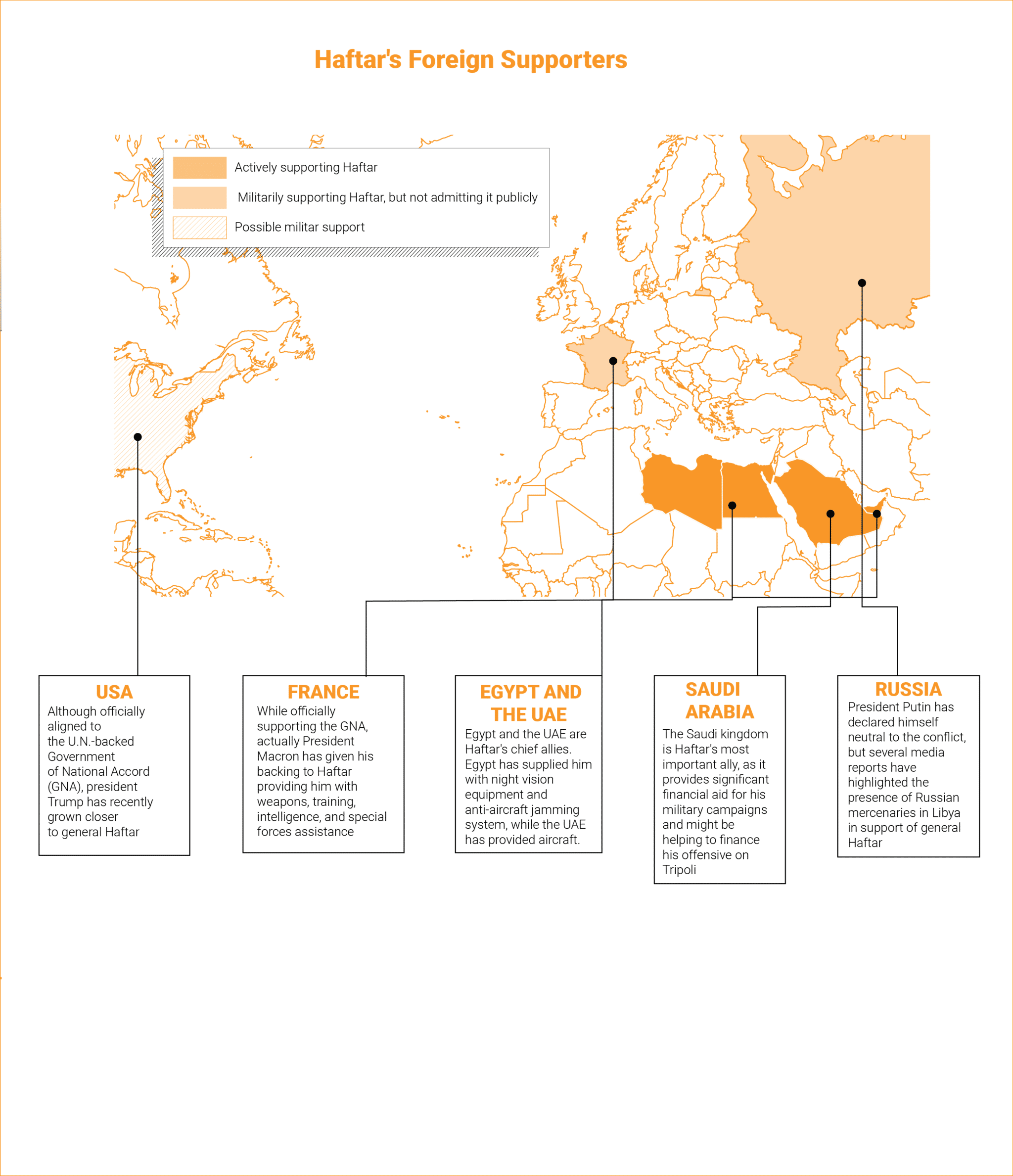
General Khalifa Haftar and his self-described Libyan National Army (LNA) declared war on the capital Tripoli on 4 April 2019. The septuagenarian strongman planned to conquer the city within days, hoping that the element of surprise would propel his forces to a quick victory.
He was wrong. His forces were met with resistance from militias in Tripoli, Zintan, Misrata and Zawaya, all of whom are uniting under the banner of protecting the capital. The battle now looks set to last for months, if not years.
With Haftar’s forces stretched thin, between Libya’s south, east and now Tripoli in the north-west, the LNA desperately needs support from its international backers. Its two chief allies are the United Arab Emirates (UAE) and Egypt. Both countries backed Haftar against Islamist forces during the war for Benghazi in 2014 and the battle for the eastern city of Derna last year.
Although it remains unclear how much support they are willing to provide for Haftar’s latest offensivei, recent developments suggest quite a lot.
It is thought that Haftar has a superior air force that is supplied by the UAE whereas Egypt has reportedly provided Haftar’s forces with night-vision equipment and anti-aircraft jamming systems. In the face of international pressure, Egypt has not supplied the LNA with troops.
Despite the help, Haftar’s largest sponsor is Saudi Arabia. Just days before announcing the attack, the conservative kingdom offered tens of millions of dollars for the operation, advisers to the Saudi government told The Wall Street Journal.
The offer, the advisers said, was made at one of several meetings that Haftar had with his international backers in the weeks and days leading up to the offensive on the capital. Haftar readily accepted Saudi money, which he intended to use to buy the loyalty of tribal leaders and recruit and pay fighters.
“We were quite generous,” one of the advisers told the newspaper.
“Haftar would not be a player today without the foreign support he has received,” noted Wolfram Lacher, a Libya expert at the German Institute for International and Security Affairs. “The last few months, pretty much everyone [has] jumped on the Haftar train.”
US President Donald Trump could also support Haftar militarily despite his ostensible support for the internationally recognizedd Government of National Accord (GNA), which is under attack in Tripoli.
On 20 April, al-Jazeera reported that Trump called Haftar to acknowledge his ‘significant role in fighting terrorism and securing Libya’s oil resources’.
The two men spoke about their shared vision to bring stability to Libya through a democratic political system. Trump’s support for Haftar was seen by the GNA as a reversal of US policy. Earlier this month, Secretary of State Mike Pompeo demanded an immediate halt to Haftar’s attack on the capital.
“People [in Tripoli] are very angry, thousands of people have come out here on the main streets and squares in Tripoli, and they are calling on the international community to stop the military aggression by Haftar’s forces,” said al-Jazeera journalist Mahmoud Abdelwahed, who is reporting from the ground.
On 19 April, both the US and Russia voted down an UN Security Council resolution calling for a ceasefire. While the US did not explain its decision, Russia said that it objected to the resolution since it blamed Haftar for the violence.
Unlike Trump, Russia is clearly reluctant to admit its backing of Haftar. However, several medias, including the Russian daily RBC, reported that Russian troops were deployed to eastern Libya in late 2018. The report cited a source close to the Russian Defence Ministry although this has not been confirmed.
The independent Russian newspaper Novaya Gazeta also published a video showing Yevgeny Prigozhin taking part in talks with Haftar in Moscow.
Prigozhin is a close aide to Russian President Vladimir Putin and is believed to head a private military company called Wagner Group. The company has reportedly deployed troops all over the world to protect Russian interests, including in Eastern Ukraine, Syria and Venezuela.
Russian officials have nonetheless claimed that they are neutral. However, independent Russian military expert Pavel Felgenhauer said that it is very possible that the Wagner Group is sending mercenaries to assist Haftar in his quest to seize the entire country by force.
“Mercenaries allow [Russia] to get involved – while not getting involved,” Felgenhauer told DW. “They allow plausible deniability.”
French President Emanuel Macron has played a double game by declaring support for the GNA while aiding Haftar behind closed doors. Although Paris has never formally admitted to backing the general, it has provided political cover, weapons, training, intelligence and special forces assistance.
A rare glimpse of France’s cooperation with Haftar was revealed after three undercover French soldiers died in a helicopter accident in Libya in 2016. The soldiers were covertly helping the LNA in its operations against Islamist fighters at the time.
“Macron was misadvised into thinking that Libya could be a quick win for his charisma,” said Tarek Megerisi, a Libyan researcher at the European Council on Foreign Relations. “He underestimated the complexity of the country.
It was half naivete, half opportunism. He tried to rely on military personnel to solve a political problem.”
Journalist Paul Taylor wrote in the American magazine Politico that French policymakers support Haftar since they see him as the only person who can help Paris secure the Sahara-Sahel belt from insurgents. That is Macron’s chief international priority following the November 2015 Paris attacks that killed 130 people.
The downside, wrote Taylor, is that Paris has concluded that autocrats are the only bulwark against mass migration and Islamist militants.




